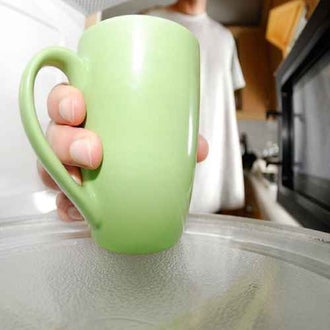The internet is full of misinformation on the safety of microwaves, today we clear this up and explain why microwaves are safe to use.
Johnson from Melbourne asked:
I heat food in my microwave pretty much every day of the week. One of my friends said microwaves can make food radioactive. Surely that's not true?"
Microwave ovens use a safe type of radiation to heat food.
There are many different types of radiation that have different levels of energy. One type, called ionising radiation can contribute to cancer risk with accumulated exposure over time, for example when exposed in nuclear accidents or via ‘atomic’ bombs.
However, microwaves, radio waves and the light that we can see, are all examples of non-ionising radiation which in the most part, is safe.
Microwaves use a safe type of non-ionizing radiation. This means microwaves are safe to use and to heat up food without you worrying about radiation.
The only non-ionising radiation which causes cancer is ultraviolet (UV) light. UV radiation has more energy than radiation from microwaves. This higher energy can increase the risk of health issues like skin cancer. That’s why we advise you to protect yourself from the sun when UV levels are three or above. Remember to slip, slop, slap, seek and slide!
- Slip on some sun-protective clothing that covers as much skin as possible.
- Slop on broad spectrum, water resistant SPF30 (or higher) sunscreen. Put it on 20 minutes before you go outdoors and every two hours afterwards. Sunscreen should never be used to extend the time you spend in the sun.
- Slap on a hat – broad brim or legionnaire style to protect your face, head, neck and ears.
- Seek shade.
- Slide on some sunglasses – make sure they meet Australian Standards.
Microwave ovens heat food safely by energising water molecules in the food so that these molecules vibrate faster, as a result, food is heated. The radiation levels of the food are not affected.
Our iHeard articles are evidence-based and we use an array of language to bring meaning to each topic. For example, in this article we use the word 'safe', this is not seen as a scientific word and therefore warrants some explanation. Discover what we mean by the word 'safe'.
iHeard hub
Thank you for joining the mission against misinformation
If you’ve heard a rumour about cancer, or are unsure about information you’ve read online, ask your own cancer question via the iHeard hub.
We want everyone to have the correct information about cancer so if you know anyone else with a cancer question, why not let them know about iHeard?
This article was last updated 20/10/2023.

